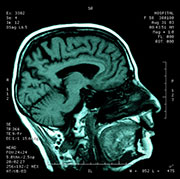- Double Mastectomy May Offer No Survival Benefit to Women With Breast Cancer
- Toxic Lead Found in Cinnamon Product, FDA Says
- Certain Abbott Blood Sugar Monitors May Give Incorrect Readings
- Athletes Can Expect High Ozone, Pollen Counts for Paris Olympics
- Fake Oxycontin Pills Widespread and Potentially Deadly: Report
- Shingles Vaccine Could Lower Dementia Risk
- Your Odds for Accidental Gun Death Rise Greatly in Certain States
- Kids From Poorer Families Less Likely to Survive Cancer
- Tough Workouts Won’t Trigger Cardiac Arrest in Folks With Long QT Syndrome
- At-Home Colon Cancer Test Can Save Lives
Concussion’s Damage to Brain Lingers After Symptoms Fade: Study


Months after concussion symptoms such as dizziness, headaches and memory loss fade, the brain continues to show signs of injury, a new study suggests.
Comparing 50 concussion patients with the same number of healthy people, researchers found that the brains of those suffering concussions showed abnormalities four months later. This happened despite the fact that their symptoms had already eased to some degree.
The findings may sway conventional thinking about when it’s safe to resume physical activities that could produce another concussion, the study authors said.
“This is a very different population than professional athletes going out and having concussions on a fairly [frequent] basis, as well as jostling their brain around their skull on a regular basis in practice,” said study author Andrew Mayer, an associate professor of translational neuroscience at the Mind Research Network in Albuquerque, N.M. It’s hard to predict an outcome based on these findings, he said, “but just because you feel you’re healed doesn’t mean you are.”
The study, which was funded by the U.S. National Institutes of Health, is published in the Nov. 20 online edition of the journal Neurology.
Considered a mild traumatic brain injury that occurs from a sudden blow to the head or body, a concussion has symptoms that range from headache and blurry vision to difficulties in sleeping or thinking clearly. Most occur without losing consciousness, according to the U.S. Centers for Disease Control and Prevention.
Mayer and his team matched 50 patients with mild concussions to 50 healthy people of similar age and education levels. They tested all participants in memory and thinking skills, as well as other symptoms such as anxiety and depression.
Special brain scans using technology that is not available in standard brain scans were also given. All tests and scans were repeated two weeks after the concussion, and again four months later.
While concussion symptoms were reduced by up to 27 percent four months after injury, brain scans of those with concussions showed abnormalities in the frontal cortex area of both sides of the brain. These abnormalities may have resulted from changes in location of fluid around brain cells or changes in the shape of certain brain cells in response to damage, Mayer explained.
The findings, he noted, suggest that the recommendation that athletes suffering concussions should refrain from play for one to two weeks may not be sufficient.
“In one or two weeks, most people typically report feeling better,” he said. “But when we start talking about it in an analogy of a burn or knee injury, it becomes a little more clear when the doctor says we need to wait a bit longer [to return to prior activities]. It makes sense that the brain would be similar to those tissue types,” added Mayer.
Kenneth Podell, co-director of the Houston Methodist Concussion Center, said the study strengthens the understanding that physical changes within the brain after concussion are separate from mental symptoms. But Podell, who was not involved in the research, added that the study couldn’t offer implications for potential long-term concussion effects such as depression or dementia.
“Everyone seen at four months should be followed in another four, six or eight months and then re-scanned,” he said. “One of the biggest problems we have looking at concussions is we try to predict long-term effects from short-term findings. This injury is very difficult to commit the type of resources needed to do that kind of very expensive and time-consuming study.”
More information
The U.S. National Library of Medicine has more on concussions.
Source: HealthDay
Copyright © 2024 HealthDay. All rights reserved.










